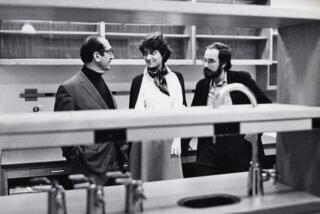NONFICTION - Feb. 28, 1993
- Share via
UP THE INFINITE CORRIDOR: MIT and the Technical Imagination by Fred Hapgood (Addison Wesley: $22.95; 195 pp.) To do or not to do, that is the never-ending question at the Massachusetts Institute of Technology. Most MIT faculty and students are more than happy to leave questions of being to their friends just down the Charles River at Harvard, suggests science writer Fred Hapgood, so absorbed are they in not doing --miring themselves in seemingly unsolvable problems much as Zen Buddhists clear their minds with a koan--in order to find the inspiration to do . “Stuckness,” Hapgood explains, is the key: When utterly lost in the tundra, when ripped of one’s confidence in one’s own notions, he writes, “the ego will sometimes relax, will allow its prisoner a few seconds of direct observation of what is sitting right in front of his face.”
When the geologist and liberal reformer William Barton Rogers conceived of MIT in 1846, the philosophy of doing was far more inglorious than the philosophy of being. Contemplative intellectuals like Galileo and Lavoisier were seen as be-ers; the do-ers, Hapgood writes, were associated with the builders, manufacturers and mechanics who seemed to stumble along “from generation to generation, recycling rules of thumb with no greater base in natural logic than the belief of 12th-Century blacksmiths that metals were best quenched in the urine of 12-year-old red-headed boys.”
Rogers’ great success at elevating technology to philosophy’s lofty plane has inspired any number of glowing MIT biographies: The last, Stewart Brand’s “The Media Lab” (1987), looked so covetously at the gadgets being invented there that one was reminded of Augustus Gloop visiting Willie Wonka’s chocolate factory, ready at any moment to reach out and grab a candy bar. Hapgood is more like Charlie, more interested in Wonka’s feelings and ideas than in his physical possessions. While this focus may disappoint those looking for a specific overview of engineering science, it surely will please those looking for comparisons between the culture of being at institutions such as Harvard (fueled by the pride that comes from a focus on social status) and the culture of doing at MIT (guided by the humility that comes from struggling to emulate nature’s own engineering).
More to Read
Sign up for our Book Club newsletter
Get the latest news, events and more from the Los Angeles Times Book Club, and help us get L.A. reading and talking.
You may occasionally receive promotional content from the Los Angeles Times.










